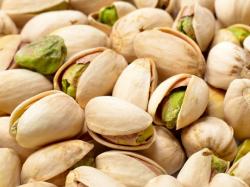Pistachios May Contribute To Heart Health In Adults With Type 2 Diabetes
August 12, 2014 | 4 min to read

FRESNO, Calif. – The benefits of including pistachios in a healthy diet extend to adults with type 2 diabetes, according to a Pennsylvania State University study published online in the Journal of the American Heart Association.
Adults with well-controlled type 2 diabetes, who were otherwise healthy, participated in a randomized, controlled clinical study and showed a more positive response to stress following a diet containing pistachios than when following a standard low-fat control diet. The healthy diet, which included two servings daily of pistachios, significantly reduced peripheral vascular resistance, increased cardiac output, improved some measure of heart rate variability and importantly reduced systolic ambulatory blood pressure.
Dr. Sheila G. West, principal investigator and professor of biobehavioral health and nutritional sciences at Penn State, and her colleagues reported similar beneficial results in a study of adults with elevated LDL cholesterol and stress, published two years ago. Increasingly it has been found that pistachios, both salted and unsalted, contribute to a heart-healthy diet in high-risk groups. Pistachios contain good fats and fiber, potassium and magnesium.
In this Penn State study, test diets included a low-fat control diet with high carbohydrate snacks (27 percent fat and 7 percent saturated fat) compared to a moderate-fat diet (33 percent fat and 7 percent saturated fat) that included 3 ounces, or 20 percent of the calories, from pistachios. The servings consisted
of equal amounts of salted and unsalted nuts. All meals were provided to the 30 participants, an equal number of men and women, ages 40-74. The calorie levels for the subjects were based on the Harris-Benedict equation so that calories and body weight did not change throughout the study.
A two-week run-in period on a typical western diet preceded the first test diet. Participants discontinued all dietary supplements at least two weeks prior to the beginning of the study. These adults were then administered each test diet for four weeks, separated by two-week compliance breaks, randomized and in a counterbalanced order. At the end of each diet period, including the run-in weeks, participants underwent comprehensive testing.
Researchers measured blood pressure and total peripheral vascular resistance, both at rest and during stress tests, which consisted of holding a hand in ice water for more than two minutes and a difficult math challenge. “After the pistachio diet, blood vessels remained more relaxed and open during the stress tests,” confirmed Dr. West. She continued, “The pistachio diet reduced their bodies’ responses to stress.”
Twenty-four hour systolic blood pressure was significantly lower following the pistachio diet compared to the control diet, with the largest reduction observed during sleep. According to Dr. Kathryn Sauder, a co-investigator who conducted the measurements, “This finding was important because individuals who do not display a dip in blood pressure during sleep may be more likely to experience a cardiovascular event.”
Dr. West concluded, “A moderate-fat diet containing pistachios may be an effective intervention to reduce cardiovascular risk in persons with type 2 diabetes.” In spite of being obese and having a diabetes diagnosis, participants had normal blood pressure and only moderate dyslipidemia. However, even in relatively healthy diabetics, there is room for improvement. The results of this study suggest that a healthy diet containing pistachios can add to the protective effects of drugs for persons with type 2 diabetes.
The researchers suggested future studies should enroll larger samples, include ambulatory blood pressure as a primary outcome and test the effectiveness of pistachio consumption on cardiovascular risk factors in a free-living setting.
The study was supported by the American Pistachio Growers, Fresno, Calif., with partial support from the National Institutes of Health-supported Clinical Research Center at Pennsylvania State University.
Pistachio Facts
Pistachios are nutrient rich and full of antioxidants, vitamins, protein and fiber. A one-ounce serving of pistachios equals 49 nuts, more per serving than any other snack nut. They are cholesterol free and contain just 1.5 grams of saturated fat and 12.5 grams of fat per serving, the majority of which comes from monounsaturated and polyunsaturated fat. In addition, they contain a significant amount of potassium, 300mg, and 3g fiber per serving.
About American Pistachio Growers
American Pistachio Growers (APG) is a non-profit voluntary agricultural trade association representing more than 600 grower members in California, Arizona and New Mexico. APG is governed by a democratically-elected board of directors and is funded entirely by growers and independent processors with the shared goal of increasing global awareness of nutritious American-grown pistachios. APG pistachios are the “Official Snack” of USA Water Polo, professional snowboarder Jeremy Jones, British pro cyclist Mark Cavendish and the Miss California Organization. For more information, visit www.AmericanPistachios.org
______________________________________
Sauder KA, McCrea CE, Ulbrecht JS, Kris-Etherton PM, West SG. Pistachio consumption modifies systemic hemodynamics, increases heart rate variability, and reduces ambulatory blood pressure in type 2 diabetes. Journal of the American Heart Association. 2014;3:e000873; originally published June 30, 2014; doi:10.1161/JAHA.114.000873
West, SG, Gebauer SK, Kay CD, Bagshaw DM, Savastano DM, Diefenbach C, Kris-Etherton PM. Diets containing pistachios reduce systolic blood pressure and peripheral vascular responses to stress in adults with dyslipidemia. Hypertension. 2012:60(1):58-63.
Source: American Pistachio Growers
